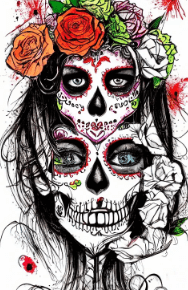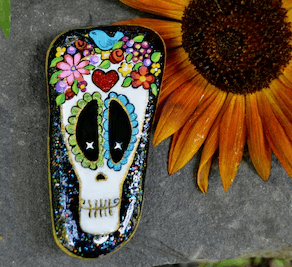
Art:3r936r0hfc4= Sugar Skull
The Art:3r936r0hfc4= Sugar Skull serves as an emblematic representation of the Day of the Dead, intertwining ancestral reverence with artistic expression. Rooted in Mesoamerican traditions, these colorful artifacts not only commemorate the deceased but also embody intricate cultural narratives. The craftsmanship involved reveals a spectrum of techniques and styles, each bearing the weight of historical significance. However, what lies beneath the vibrant surface of these creations often prompts deeper contemplation about our own relationships with memory and mortality. One must consider how these artistic forms resonate within contemporary contexts, inviting further exploration into their evolving meanings.
Read also: Art:3qsse_Wjeam= Dark Magician Girl
Historical Significance of Sugar Skulls
The historical significance of Art:3r936r0hfc4= Sugar Skull can be traced back to the ancient traditions of Mesoamerican cultures, particularly the Aztecs, who viewed death not as an end but as a continuation of life’s journey.
Integral to the Day of the Dead, these vibrant creations symbolize remembrance and celebration. They embody Mexican traditions that honor ancestors, reflecting a deep cultural connection to life, death, and the afterlife.
Artistic Techniques and Styles
Sugar skulls exemplify a rich tapestry of artistic techniques and styles that reflect the cultural heritage of Mexico.
Vibrant color palettes, often featuring bold hues, bring life to these creations, while intricate patterns and texture contrasts enhance their visual appeal.
Artists skillfully blend traditional motifs with contemporary flair, resulting in a captivating celebration of artistry that invites personal expression and cultural pride.

Cultural Impact and Symbolism
Throughout Mexican culture, sugar skulls serve as powerful symbols of remembrance and celebration during Día de los Muertos, or the Day of the Dead.
These vibrant representations embody a rich cultural narrative, merging joy and sorrow. As artistic expressions, they challenge conventional views of mortality, inviting individuals to embrace life’s cycles and acknowledge the interwoven tapestry of memory and identity in cultural representation.
Personal Reflections in Art
Artistic expressions often serve as intimate reflections of personal experiences and emotions, allowing creators to distill their thoughts and feelings into tangible forms.
In the realm of sugar skulls, each intricate design encapsulates emotional connections—celebrating life, death, and memory.
This art form fosters a dialogue between the artist and observer, inviting shared introspection while honoring individual narratives woven into the vibrant tapestry of culture.
Read also: Drawing:Sdn2sx5y0y0= Dinosaurs
Conclusion
The Art:3r936r0hfc4= Sugar Skull stands as a vibrant testament to the intricate interplay of life and death, a celebration of memory and legacy. Each color and pattern dances across the surface, weaving stories of love and loss, while echoing the cultural heartbeat of Mesoamerica. As generations craft these symbols, they breathe life into the past, forging connections that transcend time. Thus, the sugar skull emerges not merely as art, but as a powerful narrative, a bridge uniting the living with the departed.




